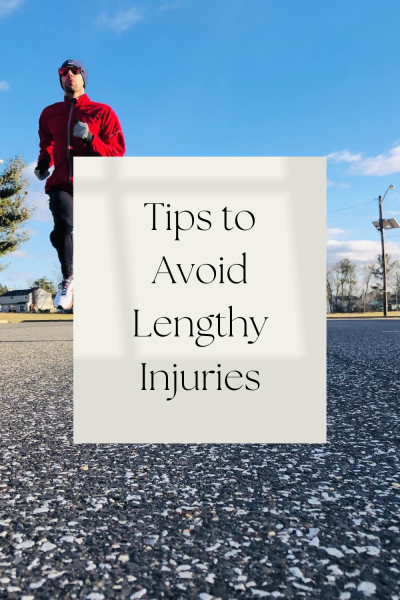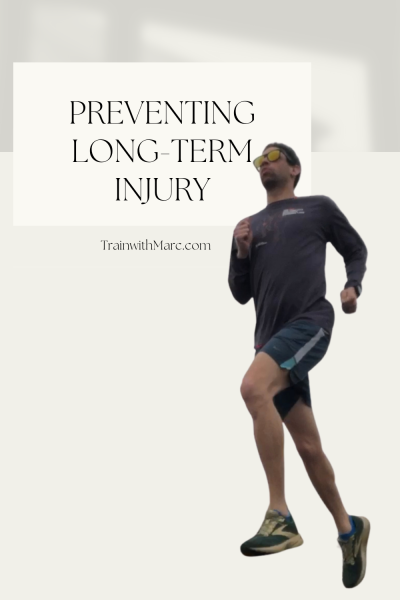Injuries are the worst. They derail your training plans and foil your fitness goals. If you’re going to do the high-intensity training that’s required of you to reach your big, scary goals, then sometimes, running injuries do pop up.

What you do to keep a minor injury from becoming a big one is what takes you from an average runner to a much better one. All runners get injuries, but keeping an injury small and only missing a few days is what keeps your momentum and allows you to get back to training at a high level.
To keep those minor injuries from becoming major, you’ll want to follow some simple and intuitive strategies that I’ve used over the years to keep those small injuries just that: small.
One of the many major injuries I’ve had has been stress fractures in my shins – both the inside of the bone and the backside of it. They’ve taken a long time to heal and even after they do, I’ve felt off for many more weeks and months after I was cleared to run. If I had paid attention to the warning signs and taken the advice below, there’s a good chance that I would not have had to deal with the pain and setbacks that the stress fractures left me with.
Don’t get it wrong, a small injury might still require a full week off from training. But a week away is much more tolerable than a month off because you didn’t listen to your body.
During a recent minor pain in my knee, these are the steps I took to make sure the injury didn’t become something big:
- Total rest day (or two) before cross-training.
- Advil 1-2 x per day.
- Icing 2-3 x per day, possible ice bath.
- Stretching and mobility.
- Seeing a specialist – active release, massage therapy, or acupuncture.
- Cross-training – primarily biking – to maintain fitness.
Below, I’ll outline 7 pieces of advice that if I had used myself, I would have cut down on the number of long-term injuries I faced in my running career.
Preventing Long-Term Injuries
- Stop running and assess what’s going on. A lot of runners I know will continue to hobble through many runs before deciding that they are truly injured. It’s too late. Stop when you first feel something coming on. At that point, it might only be a day or two you have to take off from running. But if you don’t stop, it could be weeks or months before you get things situated.
- Stretch after your workouts. Take 10 minutes to stretch your major muscle groups: calves, hamstrings, quads, hips, IT bands, back, and shoulders. Active stretching before you run and static stretching after can help promote circulation and provides muscles with the proper range of motion required in running.
- Cross-train to maintain your fitness. If one form of cross-training hurts your injury or you feel uncomfortable doing it, then find something else that doesn’t bother your injury. Cross-training will allow you to stay in shape while your injury heals. Cross-training might not be your thing – that’s okay – it’s only meant to be temporary until you’re back to full strength.
- Seek a specialist. Believe it or not, there are doctors who are also runners who specialize in taking care of athletes. The sooner you are able to get in and see them, the quicker you can heal your injury and get back to business as normal. It’s also a good idea to see them when you’re healthy because they can keep you healthy and injury-free.

- As you’re waiting to get in to see a specialist (active release, chiropractor, orthopedic, or dry needling, etc), you can also be doing self-care including icing, massaging, foam rolling, and as I’m sure you’re aware, many other forms of taking care of yourself.
- Strength training is a great equalizer that many runners are not paying enough attention to. Strength training helps keep you balanced, allows you to carry your body when you’re running, and prepares your body for the workload you are going to do. Strength training doesn’t have to be complicated or extensive – even 40-60 minutes a week is enough to keep you strong and injury-resistant.
- Complete rest is definitely something that you might have to consider. I know you don’t want to hear it, but it’s possible that the only thing that will help you heal is avoiding running and exercising. If you rest right away, it’s quite possible that you don’t need a lot of time to recover – maybe a day or two is all your body needs to sort itself out.
Why You Might Be Getting Inuried
If I was really in tune with my body – which back in the day I probably wasn’t as much as I could have been or should have been – I know that I could have avoided many of the long-term injuries I suffered. Knowing what your body can handle and how you should feel is a major factor in how you improve as a runner.
There are plenty of reasons why you might be getting injured and they range from not listening to your body all the way to not paying attention.

- Are you doing something you don’t normally do? Eating poorly, more mileage, faster miles, sleeping less, recovering less? Well, these are all possibilities on why your body is breaking down quicker. Without fixing these issues, you’re likely to see more injuries.
- Does your training have any structure? Do you know what you’re doing week by week and are you improving at all? If not, you’ll want to seek out the help of a coach or someone you trust to help you with your training.
- Are you listening to what your body is saying? If you aren’t, you are ignoring vital reminders as to what your body is requesting. A day or two off because of a small injury is much more tolerable than a few months because you didn’t listen.
How to Come Back Stronger
You aren’t going to get back to running without rest and recovery. That means that everything you do has to make your running injury happy.
- Eat foods that are good for you and eliminate all foods that don’t speed up recovery. Lay off the chips, the cookies, the beer, and the soda. Feed yourself quality foods that’ll help your body with recovery.
- Get a ton of sleep. Sleep aids in recovery and that’s the name of the game.
- Stay positive. When you’re injured, there isn’t much positivity going on. I get that. Find something to latch on to and make the most of the situation you’re in. Positive thinking is much healthier than negative thinking, so you might as well be positive.
- Do your rehab work. Just resting will not get you back to healthy running. Spend your running time doing rehab drills specific to your needs.
- Improve your imbalances. You got injured for a reason – something was probably off somewhere. Spend this time working from the ground up on getting stronger, more flexible, and more athletic, so that when you come back, you can come back stronger.
Recap:
Take care of yourself and take control of what you can. Get your rest, listen to your body, and adjust your training to accommodate your body’s needs. If you don’t know what you’re doing wrong, then it’s time to invest in a running coach to guide your training. Before you let a small injury become a big one, think big picture. Is this run/workout worth the potential bigger injury?
Thanks for reading until the end! Ready for more?
Want my weekly running newsletter?
- As a distance runner, we can't ALWAYS be in LSD mode
- Anyone have plans this Sunday? How 'bout an easy 10?
- What I learned and so you can use with your own training
Ready to Shop Small & Local?
Check out TrainwithMarc’s online store and get ready for your new training cycle!
Looking for running resources?
Find me on social media!
Searching for a running coach? TrainwithMarc has flexible schedules, dynamic plans, and access to a coach who’s worked with every type of runner.
TrainwithMarc will design a training plan based on your needs, running history, and your goals.
Gear I Love

My Favorite RUNNING gear from Amazon ⬇️
Feetures socks: https://amzn.to/36gNRjU
Tifosi Sunglasses: https://amzn.to/349OuJx
Garmin 235: https://amzn.to/2YgXJ9M
Garmin heart rate monitor: https://amzn.to/2JUun8a

Current Running Shoes ⬇️
Brooks Levitate: https://amzn.to/2GazmUh
Brooks Revel: https://amzn.to/3ndnwcO
Nike Pegasus: https://amzn.to/36htGlX

Running Recovery Gear I use daily from Amazon ⬇️
Sonic X Percussion Massage Gun: https://amzn.to/2S87qTt
Foam Roller: https://amzn.to/2MzrAly
CEP Compression socks: https://amzn.to/30gZLGY

TrainwithMarc’s Social Media links ⬇️
Website: trainwithmarc.com
Instagram: @TrainwithMarc_LLC
Twitter: @marcpelerin
Facebook: @TrainWithMarc
TikTok: @Run_Coach_Marc
Venmo: @marcpelerin















1 thought on “These Tips Will Help You Avoid Long-Term Running Injuries”